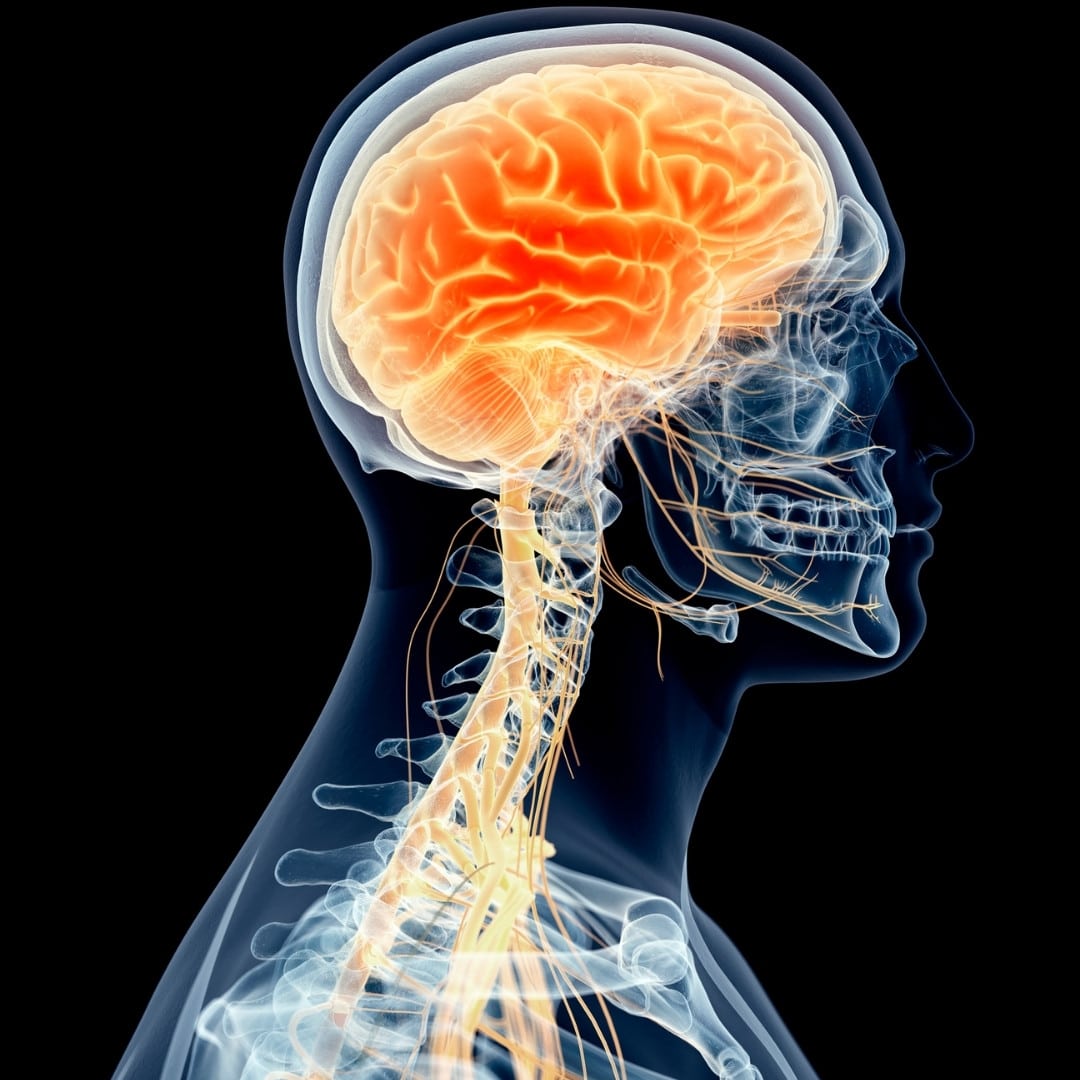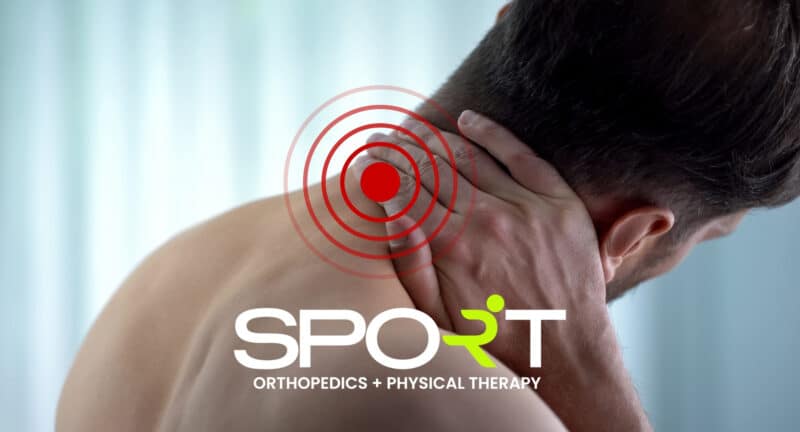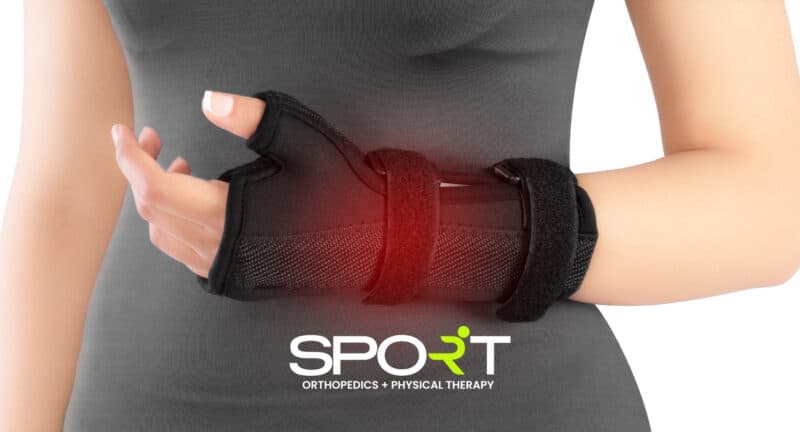Pinched Nerve Treatment in Frisco and Dallas
Pinched Nerves Lower Back, Nerve Compression, Mononeuropathy, Radiculopathy
Our spine, as everyone knows, is an essential structure in the body. The vertebrae are the bones that surround the spinal cord. The spinal cord itself runs directly through the middle of the vertebrae, but nerve roots branch off between the vertebrae. Sometimes, the nerves and nerve roots in our body can become “pinched” or compressed. This is what we commonly call a pinched nerve. A more technical term is “radiculopathy.”
Even though this issue is more common in the lower back (causing lumbar radiculopathy), it can also occur in the cervical spine near the neck. This results in cervical radiculopathy. It can even occur in the arms and legs. No matter where you experience your pinched nerve, SPORT is here to provide you with top-notch treatment. We offer a number of treatment options that we will customize to fit your specific needs. To schedule an appointment with a provider or to schedule physical therapy, please call 469-200-2832 today.
What Is a Pinched Nerve?
A pinched nerve usually happens if the tissues, cartilage, muscles, tendons, or bones that surround the nerve apply too much pressure to the nerve. This nerve compression can result in nerve pain, muscle weakness, numbness, and tingling.
This can happen in many different areas of the body, including the spinal canal, lumbar spine, cervical spine, spinal discs, arms, and the legs. It can even affect the wrists and fingers, causing carpal tunnel syndrome. Luckily, compressed nerves often resolve themselves within a few days or weeks. However, more severe cases will likely require treatment or even surgery.
Where Can a Pinched Nerve Occur?
A pinched nerve may occur in a number of places throughout the body. It mostly depends on the location of the compressed nerve. Below, we list the most common areas where people experience pinched nerves.
- Shoulder and neck (cervical radiculopathy)
- Upper chest and back (herniated disc, pinched spinal nerve, thoracic radiculopathy)
- Arms and elbows (such as you hit the ulnar nerve or your “funny bone”)
- Hands and wrists (carpal tunnel syndrome)
- Legs and hips (lumbar radiculopathy)

What Causes Pinched Nerves?

Certain conditions or accidents can lead to nerve damage or a compressed nerve. The following are some common causes of most pinched nerves.
- The normal wear and tear of the spinal nerve roots due to aging can affect nerve function. Over time, the discs in the spine tend to flatten out. As the vertebrae move closer together from this, the body may produce bone growths. These growths often compress nerves, causing pain.
- Conditions such as rheumatoid arthritis often cause joint inflammation. Inflammation in the joints can apply pressure to nearby nerves.
- Sudden sports injuries or accidents can lead to a pinched nerve root. Additionally, lifting, pulling, or twisting your back can cause a herniated disk.
- Having excess weight on the body can cause the nerve pathway to swell, which results in a pinched nerve. Even weight gain from pregnancy can have this effect.
- Repetitive motion injuries put frequent stress on certain nerves. This is common for the wrists and hands of office workers or those who perform repetitive motions often.
- Diabetes can also result in permanent nerve damage. This happens due to the high levels of glucose in the blood.
Risk Factors for Pinched Nerves
There are a number of risk factors associated with a compressed nerve. Below, we outline common conditions or risk factors that lead to pinched nerves.
- Having poor posture or body positions
- Herniated or bulging discs
- Spinal arthritis
- Weight gain and excess weight
- Pregnancy weight gain
- Tumors
- Traumatic injuries
- Genetic predisposition
- Repetitive motion injuries
- Scar tissues
- Bone spurs
What Are the Symptoms of Pinched Nerves?
It’s important to understand the warning signs and symptoms of a pinched nerve. Symptoms of a pinched nerve include the following.
- Pins and needles sensations
- Neck pain
- Muscle weakness in the affected area
- Radiating pain
- Chronic pain in the affected area
- Shooting pain
- Foot weakness
- Feeling like your hand or foot has fallen asleep
- Numbness or a decrease in sensation in the affected area
If you experience other symptoms along with the above symptoms, or if your symptoms worsen, we recommend speaking with our orthopaedic surgeons. We can offer pain management, conservative treatments, or even surgical treatment if all else fails. To speak with an orthopedic specialist or physical therapist, don’t hesitate to contact our office.
How Common Are Pinched Nerves?
This is a fairly common condition. In fact, a pinched nerve occurs in approximately 85 of every 100,000 adult patients in the United States. Although a pinched nerve may affect nearly anyone, it is more common in adults aged 50 and older. This is because they are more likely to have arthritis and spinal degeneration, which can result in a herniated disk.
Can a Pinched Nerve Cause More Serious Problems?
While unlikely, it is entirely possible for a pinched nerve to lead to more serious issues. Excess fluid and swelling around the nerve root can lead to a damaged nerve. It’s important to contact your doctor if you have severe pain or if your symptoms do not improve after around a week. This could indicate a more serious problem, such as neurological issues.
How Is a Pinched Nerve Diagnosed?
When you first see your doctor, they will ask about your symptoms. They will also perform a physical examination of the area. This generally leads them to suspect a pinched nerve. To confirm a diagnosis, they may order the following tests.
Pinched Nerve Testing
- Blood tests: This will measure your blood glucose levels or thyroid levels to rule out other potential issues.
- X-rays: These imaging tests allow doctors to view how your bones are positioned. This allows them to see any narrow spaces or damage that could lead to a pinched nerve or bone spurs.
- Magnetic resonance imaging (MRI): This allows doctors to observe detailed pictures of the body to identify nerve root compression.
- Spinal tap: Your doctor will collect cerebrospinal fluid from the area around your spinal cord. This fluid goes to a lab to identify infection or inflammation.
- Nerve conduction tests: These tests measure electrical impulses traveling through your nerves and muscles. It can indicate damage to the nerves.
- High-resolution ultrasound: Ultrasounds use sound waves to create pictures of structures inside the body. They are very helpful for diagnosing carpal tunnel.
- Electromyography: During this test, a doctor will insert a needle electrode into the skin. This helps to identify damaged nerves that lead to the muscles and other soft tissues.
How Is a Pinched Nerve Treated?

According to the National Institute of Neurological Disorders and Stroke, rest for the affected area is the most commonly recommended treatment for pinched nerves. Initially, your doctor will ask that you refrain from engaging in any activity that aggravates the pain.
Depending on the location of your pain, your doctor may recommend wearing a brace or splint to immobilize the area. Below, we list other treatment options that aim to relieve pain and reduce swelling for those experiencing pain.
Non-Surgical Pinched Nerve Treatments
When your symptoms first arise, there are certain home treatments we recommend trying.
- Rest: Begin by resting the affected body part, as well as the surrounding tissues. This could resolve the problem on its own.
- Nonsteroidal anti-inflammatory drugs (NSAIDs): Over-the-counter medications that reduce swelling and relieve pressure may be enough to help with your pain.
- Heat and cold therapy: Try to apply ice to the area for around 10-15 minutes at a time a few times a day. Ice should be used for the first few days after you notice the pain. Then, switch to applying heat to increase blood flow in the area. Do this for approximately 10-15 minutes a few times a day. If you’re wondering, “Is heat or ice better for back pain?”, we recommend reading our related blog.
If these conservative methods do not improve your pain, we recommend speaking with a doctor about your symptoms. They will likely recommend the following non-surgical treatments initially.
- Physical therapy: Especially when you have back or neck pain, this is a highly beneficial treatment option. A Dallas physical therapist can help you engage in certain movements and specialized exercises to gradually improve your common symptoms.
- Trigger point injections: If you feel pain that radiates or shoots to other parts of your body, trigger point injections are highly recommended. To relieve pain and the pins and needles sensation, these injections promote healing in the area.
- Spinal decompression: This helps significantly with sciatic nerve pain. The treatment involves very slowly realigning and stretching the spine. This provides long-term pain relief.
Surgical Pinched Nerve Treatments
The type of surgery that your doctor may recommend depends mostly on the location of your pinched nerve. Mostly, these surgeries aim to take pressure off of the affected nerve. They may also remove a bone spur or part of a herniated disc in your spine. For a pinched nerve in the wrist, your surgeon may opt for a carpal tunnel release. Another option could involve surgical repair of a nerve.
When Does a Pinched Nerve Need Surgery?
Generally, your doctor will recommend at-home treatments and conservative professional treatments before resorting to surgery. This is because most pinched nerve cases resolve on their own. Surgery is reserved for very severe or persistent cases.
What Can I Do to Prevent a Pinched Nerve?
There are a few ways you can alleviate pain from a pinched nerve, as well as prevent it. While these are not surefire ways to never experience a pinched nerve, they can greatly decrease the likelihood of them.
- Reach and maintain a healthy weight.
- Limit how many repetitive activities you engage in, and take frequent breaks when you must engage in them.
- Practice good posture and positioning. Refrain from crossing your legs or lying in one position for too long.
- If you exercise regularly, be sure to incorporate flexibility and strength training into your routine.
Should I Go to the Doctor for a Pinched Nerve?
If your symptoms last for several days with no improvement, even after self-care measures, it may be time to see a doctor. Try to rest and use pain relievers for a few days. If nothing works, call your doctor to schedule an appointment.
Pinched Nerve Doctor in Dallas and Frisco
At SPORT, our orthopedic specialists in Dallas are highly-trained and passionate about their work. We offer only the best in diagnostic and treatment technologies, so you can rest assured that you’ll be in good hands with our team. To schedule an appointment with us, please call 469-200-2832 today.
Other Conditions We Treat Include:
- Anterior ankle impingement
- Heel spur
- Bulging disc
- Sciatic nerve pain
- Ganglion cyst
- Carpal tunnel
- Shin splints


